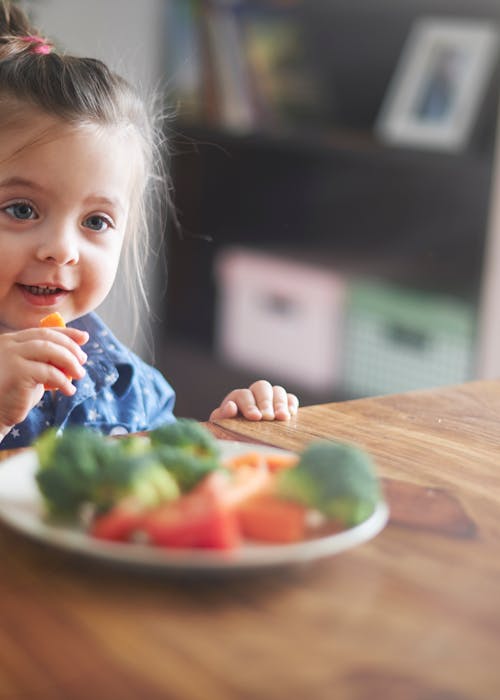

Fighting Child Poverty From the Dinner Table
Insights
April 23, 2024
By: Julie Kronick & Jenny Veloz
Few feelings are more comforting than a home-cooked meal with your loved ones; the experience offers a special type of quality time and warmth. We all remember our parents’ signature dinner dishes or begging them for our favorite snacks at the store as children, placing value on the connection between feeling full and feeling happy.
Food security is another staple of well-being for families that is unfortunately being significantly impacted by its own affordability crisis. Since 2021, prices at our local grocery stores have risen noticeably, impacting budgets for all families. According to the US Bureau of Labor Statistics, prices of groceries for home consumption rose about 21% between January 2021 and January 2024. This article from last summer shows how the average household is spending hundreds of dollars more on groceries than in 2021. Overall, with the impact of the pandemic, the expiration of SNAP emergency allotments, and a steep rise in the cost of living, the poverty rate in NYC is now up to 23%, which also correlates with an increased need for cash assistance and food stamps (SNAP). Data show that the rate of New York families with children reporting food insufficiency has increased to 13.4% since 2021.

SNAP Efforts
With an increase in need for SNAP benefits and food support, addressing food security is at the frontline of combatting child and family poverty. CCC consistently prioritizes food access at the state and city level through our advocacy. This budget season, a push by advocates and elected leaders to increase the SNAP minimum benefit to $100 has gained traction in the public discourse. Currently, the minimum is $23 per month, which with the rising cost of groceries, does not go as far at the register now as it might have in years past. NYS Senator Rachel May and Assembly Member Jessica González-Rojas, who have been vocal advocates and co-sponsors of the SNAP increase bill, even took to a local upstate grocery store to demonstrate how little $23 can afford. When speaking about the shopping trip, González-Rojas said, “We know SNAP is one of the most effective programs to address hunger, but at $23, you can barely get breakfast for the month.”
CCC is a supporter of increasing the SNAP minimum, but there is more to consider when boosting aid programs like SNAP. Last year, the Mayor’s September Management Report showed that the rate of timely food stamp processing took a steep drop from 91.9% when Adams first took office to a startling 39.7%. Thankfully, in early March 2024 the Department of Social Services commissioner announced that the backlogs in food stamp grants had been reduced by 90%. Though this is good news for families in need of these benefits, it continues to highlight the reality that so much of combatting poverty in NYC depends on proper staffing and funding for agencies like the Human Resources Administration. In compelling testimony submitted to the New York City Council’s General Welfare Committee last month, CCC explained in detail investments needed in the city budget to address staffing issues across agencies, including those that tackle food access. Click here to read the testimony.
More on Anti-Hunger
Beyond SNAP benefits, there are other anti-hunger programs and policies that connect families with food and combat poverty. CCC’s city budget priorities address funding for agencies that serve anti-hunger initiatives, including restoring funding for DOE’s Office of Food and Nutrition Services, increasing funding for HRA’s Community Food Connection program (CFC), and more. Read our priorities here, and read more on food access under “Healthy”.

Additionally, at the state level CCC has been advocating for increasing funding for anti-hunger programs such as Nourish NY (NNY), a nationally recognized program that connects hungry families with healthy food. NNY provides funding to food banks and food relief organizations to purchase directly from New York-based farmers and producers; the Hunger Prevention Nutrition Program (HPNAP), which supports food banks, food pantries, emergency shelters, and other community-based organizations by providing funding for healthy food procurement, operational expenses, transportation, and distribution; maintaining funding for the Nutrition Outreach and Education Program (NOEP), which helps ensure all eligible New Yorkers are aware of and able to participate in federal nutrition programs including but not limited to SNAP, WIC, CACFP, and school meals. Also included in our priorities are establishing and funding a statewide, permanent universal school meals program to combat student hunger and inequity and increasing the SNAP minimum benefit in New York State to $100.
While we applaud the state’s commitment to maintain funding for NOEP, along with modest increases for Nourish NY and HPNAP, we recognize more needs to be done to fight food insecurity as persistent affordability issues affect families across the state. We will continue to work with our partners to ensure these programs are adequately funded to address food access. Unfortunately, the state budget did not include establishing a fully funded universal school meal program which has been an ongoing CCC priority. Providing free meals for all students not only reduces food insecurity but improves mental and physical health and supports students’ ability to thrive academically. The budget also did not include increasing the SNAP minimum benefit. With rising food prices, SNAP remains a critical resource for many and we will continue work to strengthen the impact of this support.
What’s Next?
As families struggle to afford basic needs across the state, it is critical that we recognize the role food access and security play in combatting child poverty. CCC remains dedicated to combatting child poverty from all angles through investments and legislation. It is part of our work as an independent advocacy organization and as members of both the NY Food Policy Alliance and the New York Can End Child Poverty coalition. Not only is addressing food insecurity morally imperative work, but it also deeply aligns with New York State’s commitment to reduce child poverty by 50%. On that note, the first public hearing of New York State’s Child Poverty Reduction Advisory Council will be held on Monday, April 29, 2024 at The New Yorker Hotel on 8th Avenue from 5:30pm to 7:00pm. The public hearing will provide an opportunity for CPRAC to hear directly from New Yorkers about their experiences applying for and receiving public benefits, including SNAP and other cash assistance programs. Click here to learn more!



